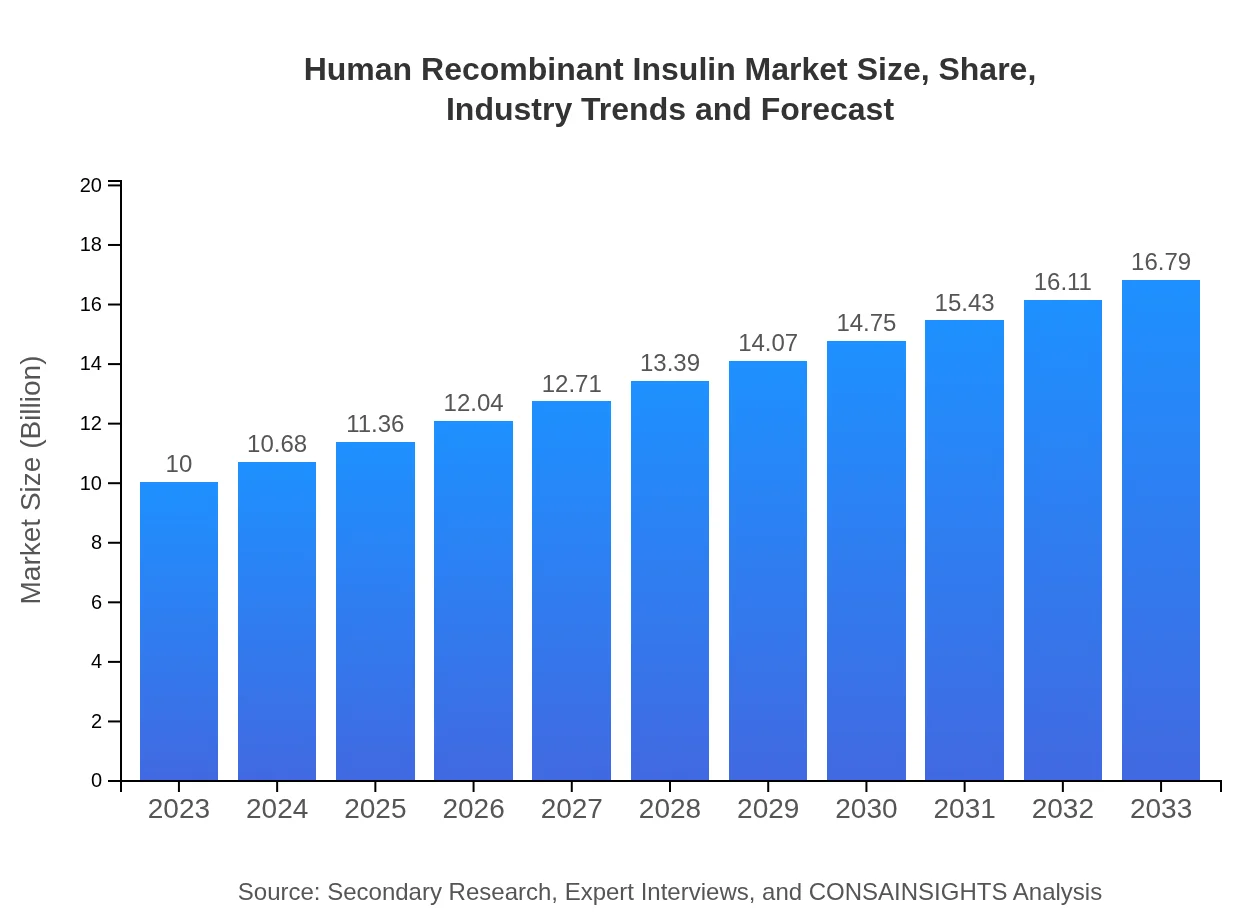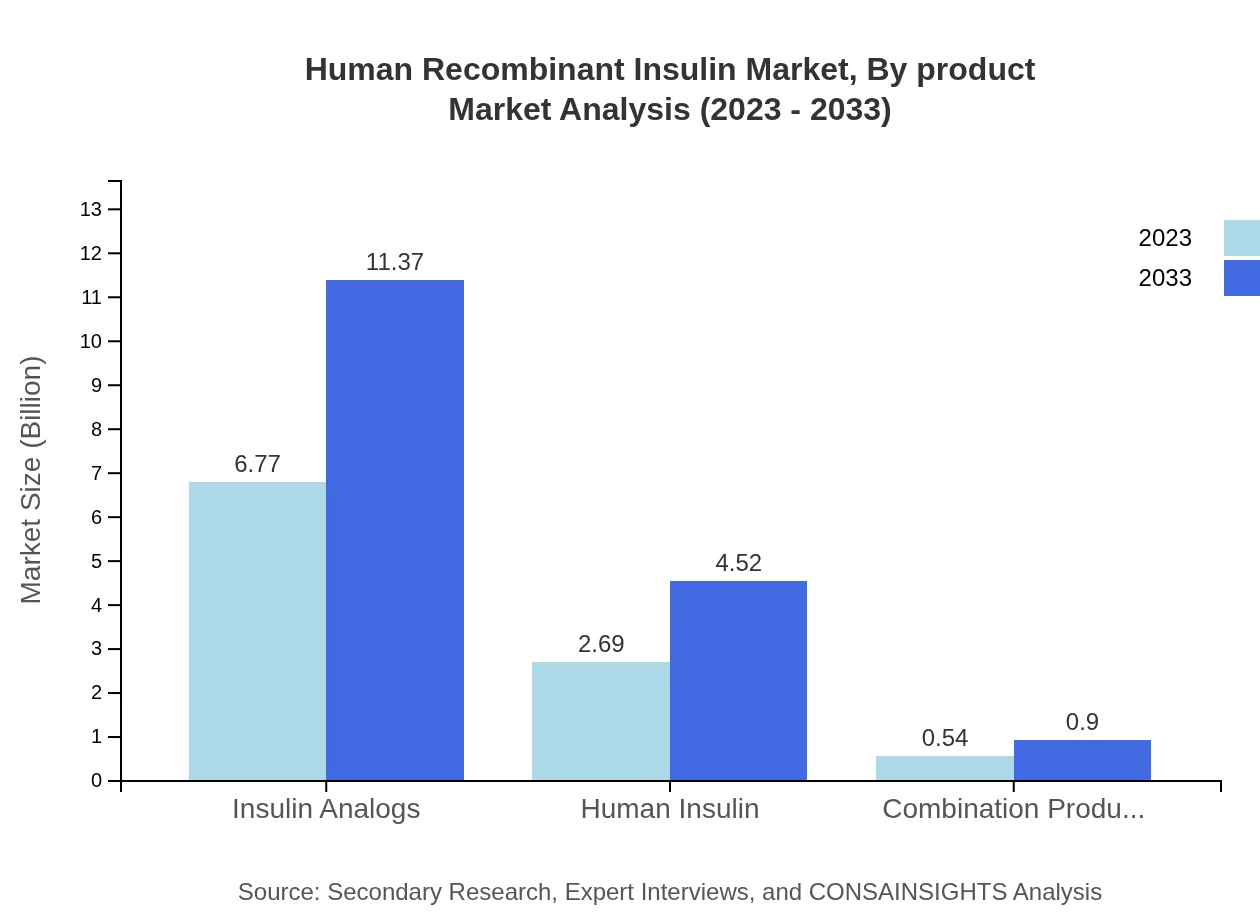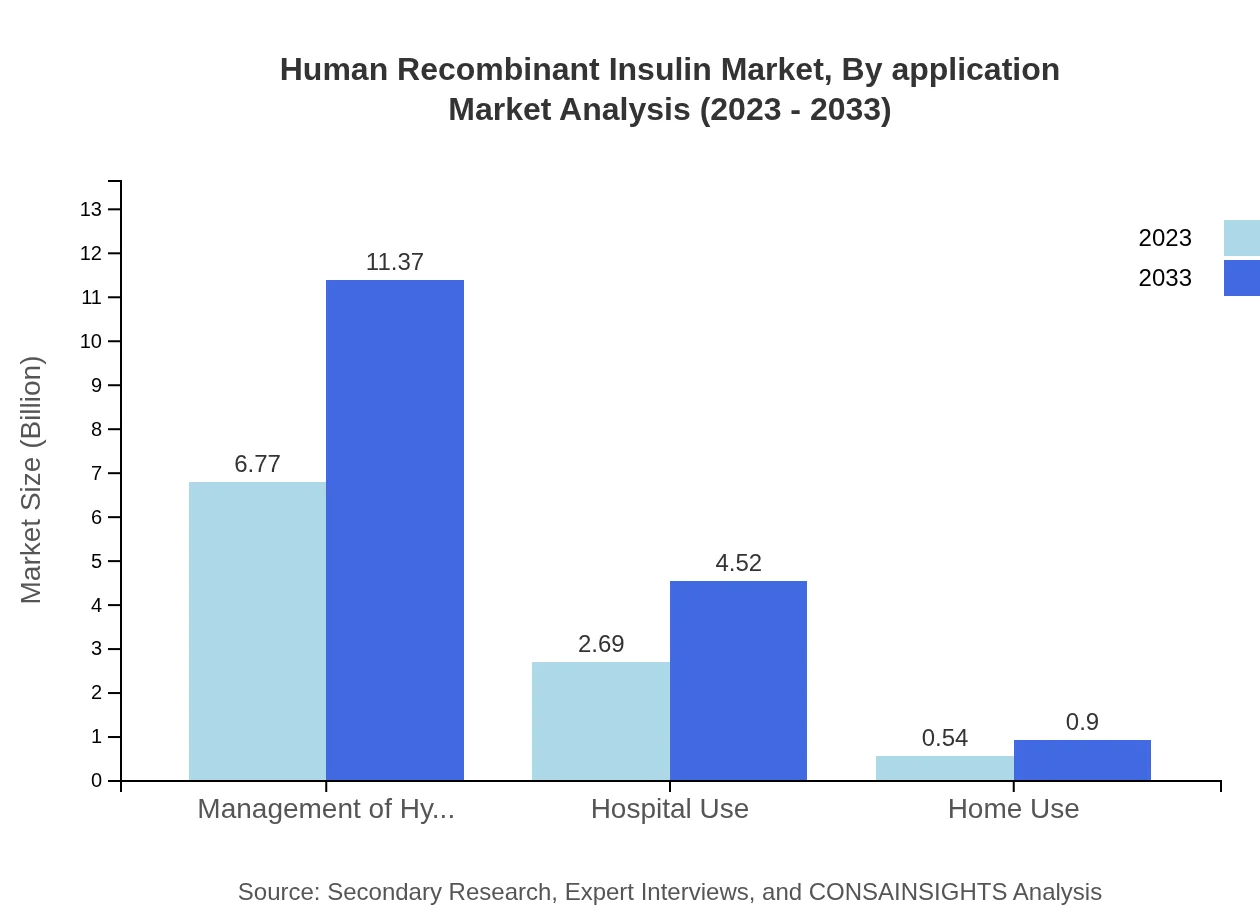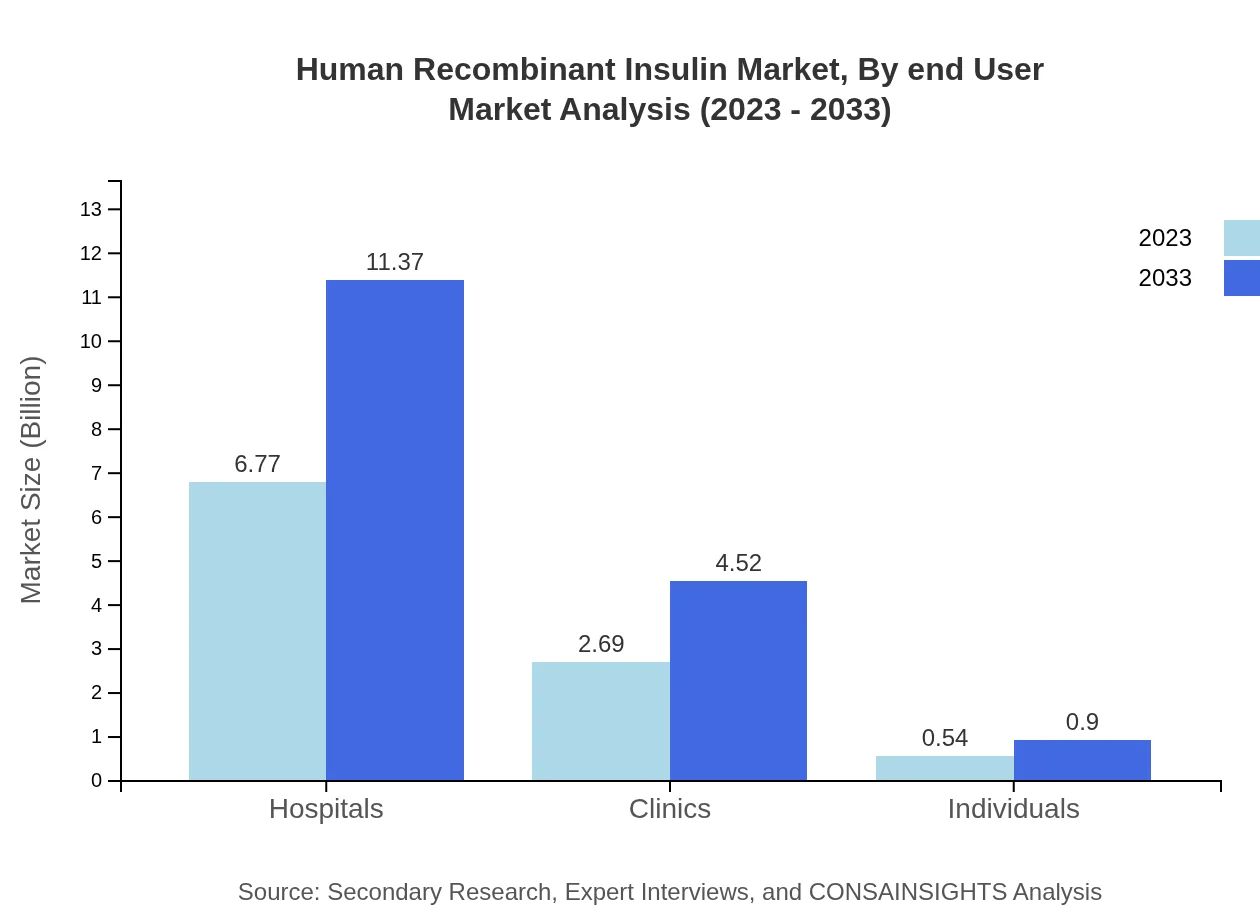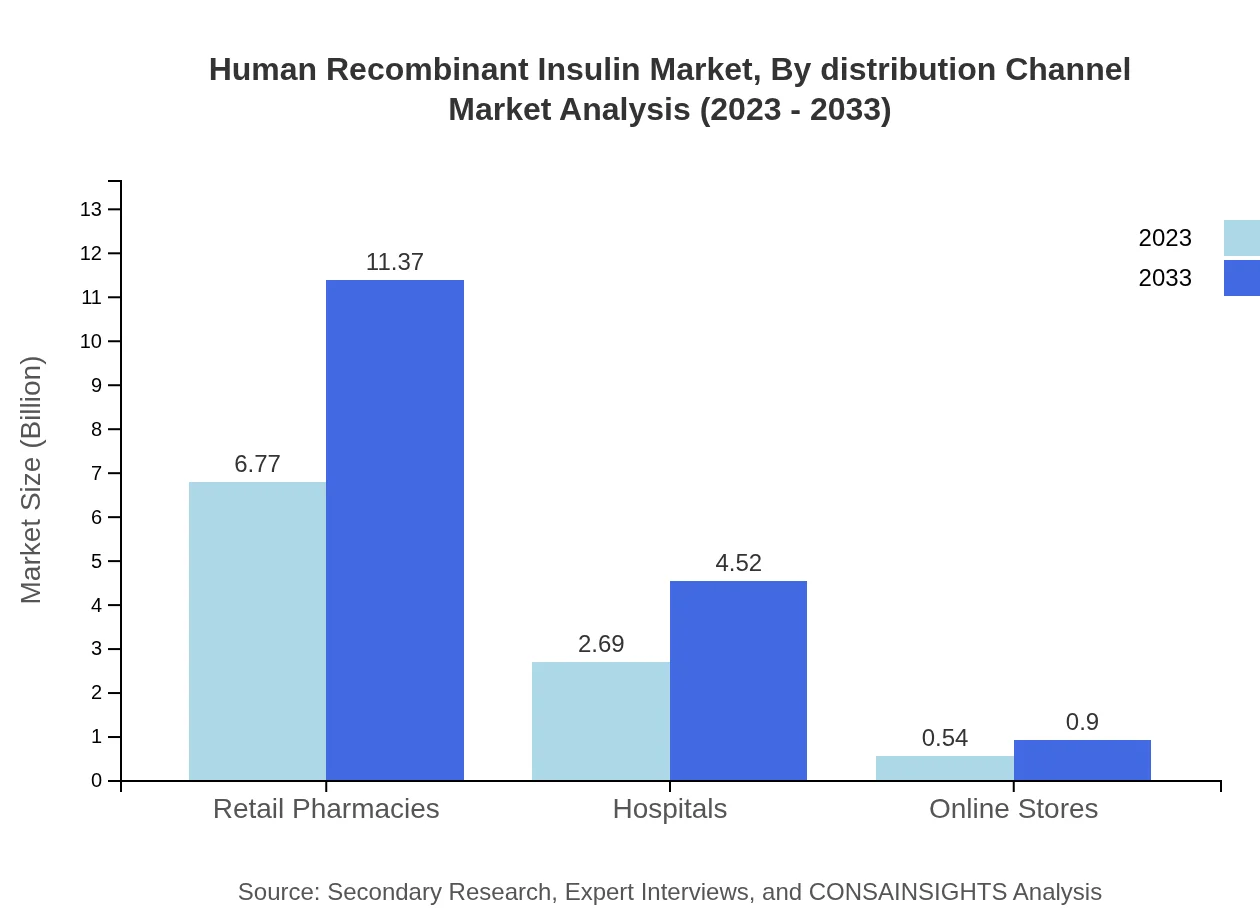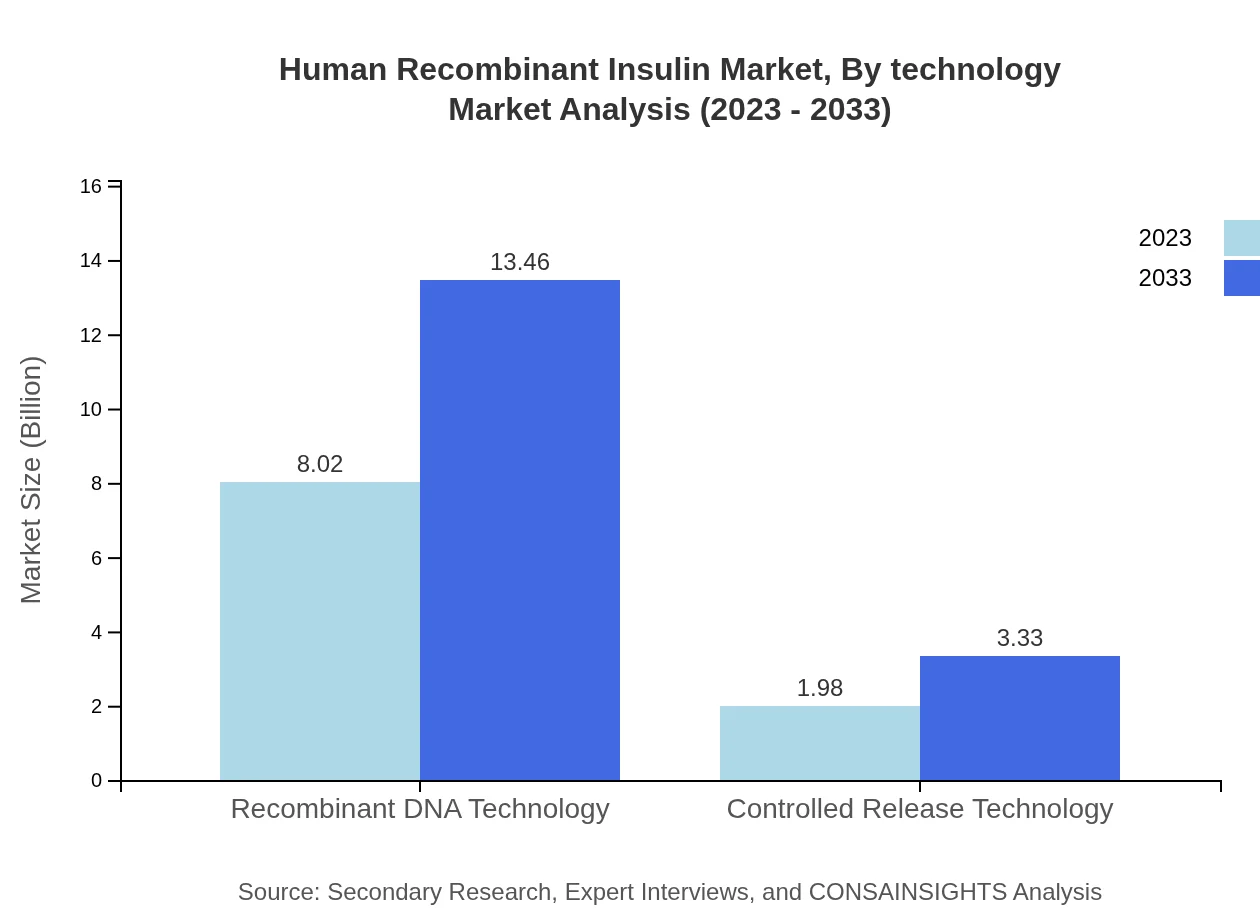Human Recombinant Insulin
Published Date: 31 January 2026 | Report Code: human-recombinant-insulin
Human Recombinant Insulin Market Size, Share, Industry Trends and Forecast to 2033
This report delves into the Human Recombinant Insulin market, providing insights into market size, growth potential, and segmentation trends for the forecast period 2023 to 2033.
| Metric | Value |
|---|---|
| Study Period | 2023 - 2033 |
| 2023 Market Size | $10.00 Billion |
| CAGR (2023-2033) | 5.2% |
| 2033 Market Size | $16.79 Billion |
| Top Companies | Novo Nordisk, Sanofi, Boehringer Ingelheim, Bristol-Myers Squibb, Merck & Co. |
| Last Modified Date | 31 January 2026 |
Human Recombinant Insulin Market Overview
Customize Human Recombinant Insulin market research report
- ✔ Get in-depth analysis of Human Recombinant Insulin market size, growth, and forecasts.
- ✔ Understand Human Recombinant Insulin's regional dynamics and industry-specific trends.
- ✔ Identify potential applications, end-user demand, and growth segments in Human Recombinant Insulin
What is the Market Size & CAGR of Human Recombinant Insulin market in 2023?
Human Recombinant Insulin Industry Analysis
Human Recombinant Insulin Market Segmentation and Scope
Tell us your focus area and get a customized research report.
Human Recombinant Insulin Market Analysis Report by Region
Europe Human Recombinant Insulin:
The European market is anticipated to grow from USD 2.48 billion in 2023 to USD 4.17 billion by 2033. The region showcases advanced healthcare technologies, high investments in diabetes care, and a substantial number of diabetic patients.Asia Pacific Human Recombinant Insulin:
The Asia Pacific Human Recombinant Insulin market is projected to grow from USD 2.06 billion in 2023 to USD 3.47 billion by 2033, reflecting a CAGR of 5.9%. The growth can be attributed to increasing urbanization, a rising incidence of diabetes, and expanding healthcare facilities across countries such as India and China.North America Human Recombinant Insulin:
North America represents one of the largest markets for Human Recombinant Insulin, with an estimated growth from USD 3.52 billion in 2023 to USD 5.91 billion by 2033. The increased healthcare expenditure, robust insurance coverage, and high prevalence of diabetes contribute significantly to market growth.South America Human Recombinant Insulin:
In South America, the market is expected to increase from USD 0.89 billion in 2023 to USD 1.50 billion by 2033, driven by growing awareness about diabetes care and improvement in diabetes management practices.Middle East & Africa Human Recombinant Insulin:
In the Middle East and Africa, the market is forecasted to grow from USD 1.04 billion in 2023 to USD 1.75 billion by 2033, supported by enhancing healthcare infrastructures and rising patient awareness regarding diabetes management.Tell us your focus area and get a customized research report.
Human Recombinant Insulin Market Analysis By Product
The Human Recombinant Insulin market includes segments such as Insulin Analogs, Human Insulin, and Combination Products. In 2023, Insulin Analogs dominate the market with a size of USD 6.77 billion and are projected to reach USD 11.37 billion by 2033, sharing approximately 67.74% of the market. Human Insulin is expected to grow from USD 2.69 billion in 2023 to USD 4.52 billion, maintaining a 26.91% market share. Combination products are smaller but growing, estimated at USD 0.54 billion in 2023, with expectations to increase to USD 0.90 billion by 2033.
Human Recombinant Insulin Market Analysis By Application
The primary application of Human Recombinant Insulin is in the management of hyperglycemia, accounting for a significant size of USD 6.77 billion in 2023, escalating to USD 11.37 billion by 2033. Its importance in diabetes treatment underlines its extensive usage across multiple healthcare settings.
Human Recombinant Insulin Market Analysis By End User
The end-user segmentation shows that hospitals dominate the market with a size of USD 6.77 billion in 2023, expected to grow to USD 11.37 billion by 2033. Clinics follow with an estimated size of USD 2.69 billion, projected to reach USD 4.52 billion, while individual consumers account for a modest USD 0.54 billion, expected to reach USD 0.90 billion by 2033.
Human Recombinant Insulin Market Analysis By Distribution Channel
The distribution channels for Human Recombinant Insulin include retail pharmacies, online stores, and hospitals. Retail pharmacies lead with sizes of USD 6.77 billion in 2023 and USD 11.37 billion by 2033. Online stores account for USD 0.54 billion in 2023, growing to USD 0.90 billion by 2033, enhancing the accessibility of insulin products.
Human Recombinant Insulin Market Analysis By Technology
Technological advancements play a critical role in shaping the Human Recombinant Insulin landscape. With recombinant DNA technology being the predominant method, expected to grow from USD 8.02 billion to USD 13.46 billion from 2023 to 2033, holding an 80.19% share. In contrast, controlled release technology is steadily growing with projections moving from USD 1.98 billion to USD 3.33 billion over the same period.
Human Recombinant Insulin Market Trends and Future Forecast
Tell us your focus area and get a customized research report.
Global Market Leaders and Top Companies in Human Recombinant Insulin Industry
Novo Nordisk:
A leading player in diabetes care, Novo Nordisk specializes in insulin therapies and continuously innovates to provide advanced solutions for diabetes management.Sanofi:
Sanofi is a major player in the production of recombinant insulins and is recognized for its commitment to patient care and quality in diabetes management.Boehringer Ingelheim:
Boehringer Ingelheim focuses on diabetes treatment, with a broad portfolio including innovative insulin products that enhance patient adherence and outcomes.Bristol-Myers Squibb:
Bristol-Myers Squibb contributes to the diabetic care market through strategic partnerships and product development focused on recombinant insulin.Merck & Co.:
Merck & Co. is involved in diabetes treatment via advanced insulin formulations and holds a significant market presence in the recombinant insulin domain.We're grateful to work with incredible clients.









FAQs
What is the market size of human Recombinant Insulin?
The global market size for human recombinant insulin is projected to be around $10 billion in 2023, with an expected CAGR of 5.2% from 2023 to 2033, indicating robust growth in demand and adoption.
What are the key market players or companies in this human Recombinant Insulin industry?
Key players include large pharmaceutical firms such as Sanofi, Novo Nordisk, and Eli Lilly, which dominate the market with extensive product lines and significant market shares in human recombinant insulin.
What are the primary factors driving the growth in the human Recombinant Insulin industry?
Growth is primarily driven by rising diabetes prevalence, advancements in biotechnology for insulin production, increasing healthcare access, and growing awareness about diabetes management and treatment solutions.
Which region is the fastest Growing in the human Recombinant Insulin?
The Asia Pacific region is the fastest-growing market for human recombinant insulin, projected to grow from $2.06 billion in 2023 to $3.47 billion by 2033, showing strong demand and healthcare improvements.
Does ConsaInsights provide customized market report data for the human Recombinant Insulin industry?
Yes, ConsaInsights offers customized market reports tailored to client specifications, ensuring that specific data needs and insights about the human recombinant insulin industry are addressed.
What deliverables can I expect from this human Recombinant Insulin market research project?
Deliverables include detailed market analysis, forecasts, competitive landscape insights, regional data assessments, and segment breakdowns that inform strategic decision-making in the human recombinant insulin space.
What are the market trends of human Recombinant Insulin?
Trends indicate a shift towards more advanced insulin analogs, increased use of combination products, and higher adoption of home and online pharmacy solutions for diabetes management, highlighting evolving consumer preferences.

